

Space. How Stuff Works.
Deep History (Evolution, Geology, Astronomy, etc.) AI. Neurology. Animal Intelligences. Biotech. Nanotech. Biology. Health. Security. Sustainability. Energy. Infrastructure. Industry. Meterials. Robots. Cyborg. Interface. Computer Hardware. Internet. Physics. Math. Stats. Curiosity. Dark Data. Stanford researchers uncover patterns in how scientists lie about their data. Stanford Report, November 16, 2015 When scientists falsify data, they try to cover it up by writing differently in their published works.
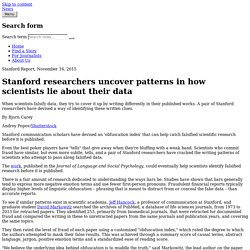
A pair of Stanford researchers have devised a way of identifying these written clues. By Bjorn Carey Andrey Popov/Shutterstock Stanford communication scholars have devised an 'obfuscation index' that can help catch falsified scientific research before it is published. Even the best poker players have "tells" that give away when they're bluffing with a weak hand. The work, published in the Journal of Language and Social Psychology, could eventually help scientists identify falsified research before it is published. There is a fair amount of research dedicated to understanding the ways liars lie. To see if similar patterns exist in scientific academia, Jeff Hancock, a professor of communication at Stanford, and graduate student David Markowitz searched the archives of PubMed, a database of life sciences journals, from 1973 to 2013 for retracted papers.
Toastshop comments on ELI5: Why, nearly everyday, is there a post on the front page detailing a groundbreaking medical discovery (i.e scientists discover how to stunt growth of cancer cells), but then I never hear about it elsewhere? The illustrated guide to a Ph.D. Imagine a circle that contains all of human knowledge: By the time you finish elementary school, you know a little: By the time you finish high school, you know a bit more: With a bachelor's degree, you gain a specialty: A master's degree deepens that specialty: Reading research papers takes you to the edge of human knowledge: Once you're at the boundary, you focus: You push at the boundary for a few years: Until one day, the boundary gives way:
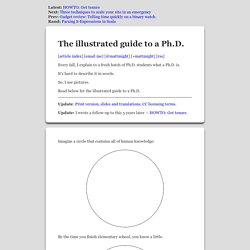
Some Online Journals Will Publish Fake Science, For A Fee : Shots - Health News. Hide captionYou could do all that brain work.
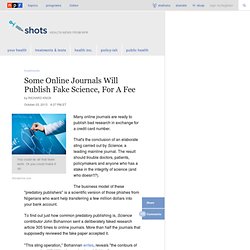
Or you could make it up. iStockphoto.com Many online journals are ready to publish bad research in exchange for a credit card number. That's the conclusion of an elaborate sting carried out by Science, a leading mainline journal. The result should trouble doctors, patients, policymakers and anyone who has a stake in the integrity of science (and who doesn't?). The business model of these "predatory publishers" is a scientific version of those phishes from Nigerians who want help transferring a few million dollars into your bank account. To find out just how common predatory publishing is, Science contributor John Bohannon sent a deliberately faked research article 305 times to online journals. "This sting operation," Bohannan writes, reveals "the contours of an emerging Wild West in academic publishing.
" Restrictive Copyright Laws Could Be Strangling Data Mining In Europe. Why Scientific American's Predictions from 10 Years Ago Were So Wrong. You are bitching about the wrong things when you read an article about science. What bugs me about lots of articles is the piss poor research that is often done.

They do a study of 300 teens in a school out in Wisconsin, then report "Study suggest teens are more interested in Sex than blah blah blah" Like that population is a great representation of the world Money Wise, I am bugged about things like, when they build crafts to go crash them into ish, like the one they crashed into that comet, and the one they crashed into mars (by accident). Seems like a giant waste of money, or at least the discovery doesn't justify the amount that went is spent.
Like the recent "life is possible on other planets".... it is probably presentation of that article that bugs me really because it is a super "uh.. duh" article, but it seems like the amount of effort put into that doesnt seem like it has real relevance to us today on planet earth. Over-Hyped, Misunderstood, Or Retracted Space Science From This Year. Correct me if I'm wrong but there was no "thruster that functioned even when turned off".
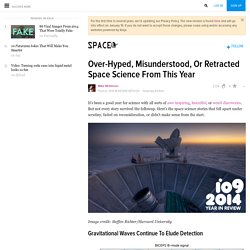
They tested three models, the cannae drive, the sawyer designed drive (from which the cannae drive was adapted) and a control that did nothing and was expect to do nothing. The cannae drive produced thrust, and the test was being done in conjunction with a nasa contractor and the cannae people. Science & Environment - 2012: The year’s science and tech news in one graphic. The Most Futuristic Predictions That Came True in 2012. 27 Science Fictions That Became Science Facts In 2012. This Month in Science (March, 2014) Top 10 Unsolved Mysteries of Science. Despite what cable news may tell you, scientists don’t really squabble over if evolution is real (it is) or if the climate is changing faster than can be explained by naturally-occurring phenomena (it is) or if vaccines are regarded as safe and recommended for most children (they are).
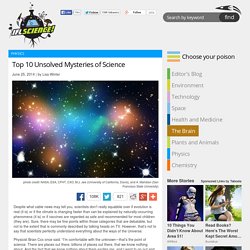
Sure, there may be fine points within those categories that are debatable, but not to the extent that is commonly described by talking heads on TV. However, that’s not to say that scientists perfectly understand everything about the ways of the Universe. Physicist Brian Cox once said: “I'm comfortable with the unknown—that’s the point of science. There are places out there, billions of places out there, that we know nothing about. And the fact that we know nothing about them excites me, and I want to go out and find out about them. So what are some of the top mysteries keeping scientists busy? Why is there more matter than antimatter? Where is all the lithium?